Dental Crowns State College
Building Beautiful, Functional Smiles

Your teeth are designed to last for a lifetime with the right care. Unfortunately, even with the best prevention, they can still be damaged by decay, disease, or trauma. Fortunately, Dr. Starostik can rebuild your smile with custom-made dental crowns in State College. He uses high-quality materials and advanced techniques to create results that look natural.
Why Choose Centre Smiles for Dental Crowns?
- Digital Impression System for Enhanced Precision
- We Accept & Maximize Dental Insurance
- Same-Day Emergency Dental Examinations
What is a Dental Crown?
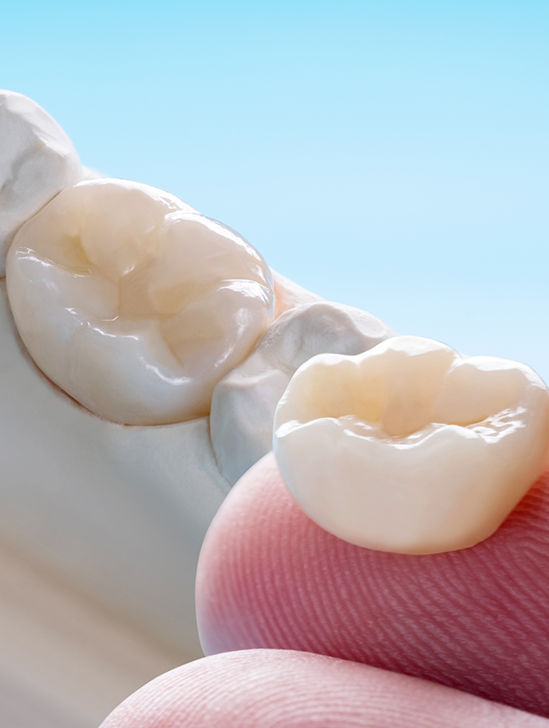
A dental crown, also known as a cap, is a covering that fits securely over the entire visible surface of a tooth. On its own, a single crown can restore the strength and appearance of a damaged or seriously decayed tooth. They can also be crafted from a variety of materials, ranging from porcelain fused to metal and ceramic to gold. Each of these materials can be custom-formed to look, act, and feel comfortable.
When is a Dental Crown Needed?
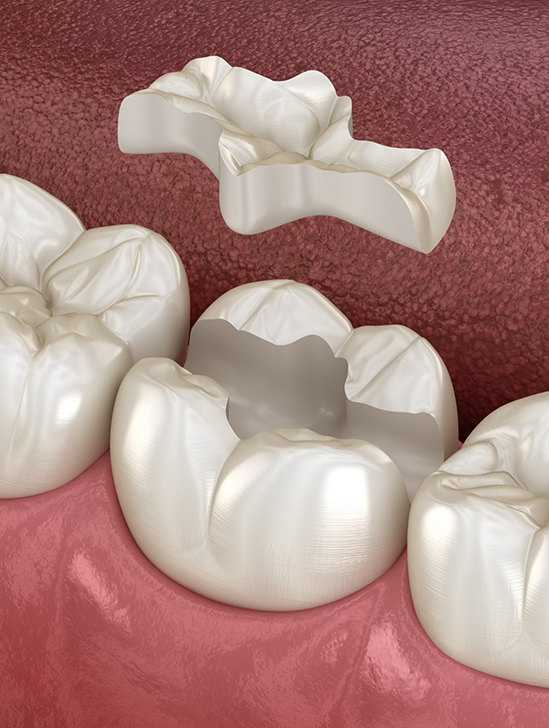
A crown is versatile to improve the health, structure, and appearance of a tooth. They are widely used for restorative and cosmetic enhancements because they mimic your real teeth. Although they are common, a crown is only recommended when it is in your best interest. A crown can be used to:
- Repair a large area of decay.
- Cover a break or fracture.
- Protect a weakened tooth from breaking.
- Cover dark tooth discoloration.
- Improve the shape of a tooth.
- Protect a tooth after a root canal.
- Replace a tooth with a dental implant.
The Process of Getting a Dental Crown
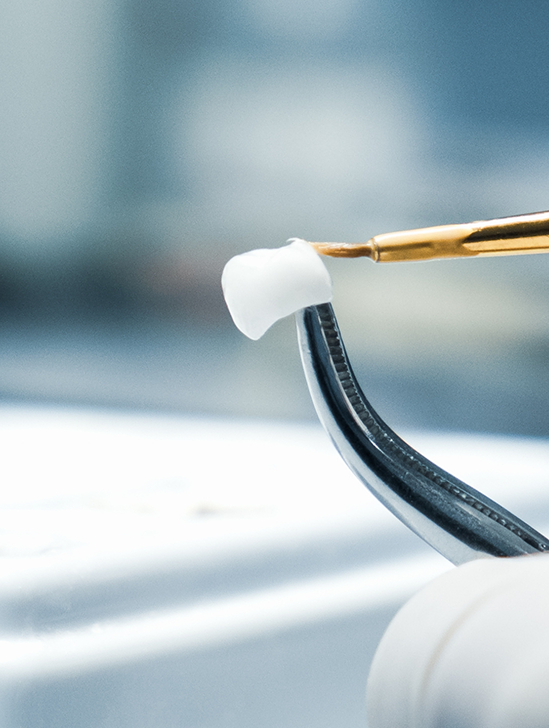
If Dr. Starostik determines you need a crown, you are scheduled to have your tooth prepared for the crown. It is cleaned and reshaped before Dr. Starostik takes an impression of your tooth to match its unique size and shape. The dental lab will also make it match the color of your enamel to blend in when you smile. It can take the lab a couple of weeks, so a temporary crown is used in the meantime. After your permanent crown is ready, you return to our dental office to have it bonded in place.
Understanding the Cost of Dental Crowns
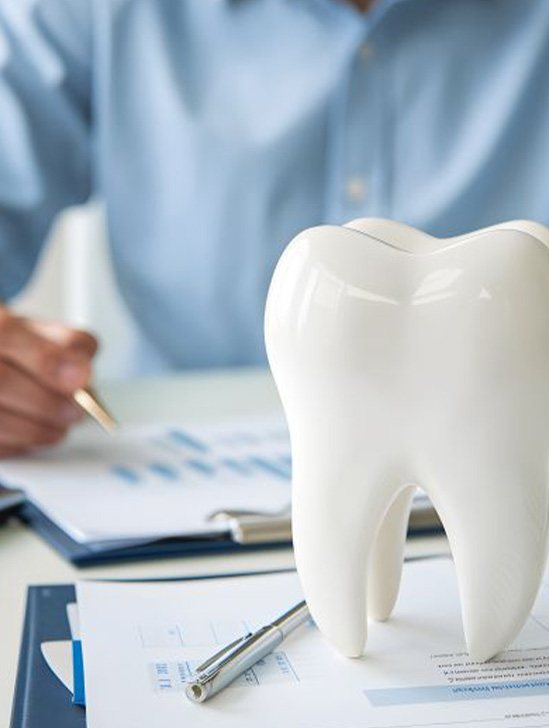
The cost of dental crowns depends on a few factors. When you visit us for a consultation, we can provide an estimate that is tailored to your unique case. Our State College team will also be happy to assist you with payment options. For example, we welcome insurance and even have a convenient in-house savings plan.
Factors that Affect the Cost of Dental Crowns
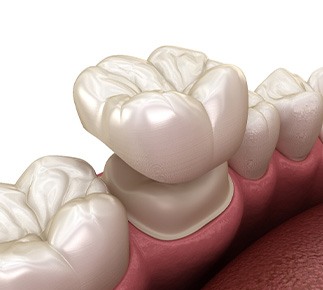
Some factors that can influence the cost of dental crowns include:
- Preliminary work. Some teeth require root canal therapy or other treatments before they can receive a crown. These services all come with their own fee.
- Crowns can be constructed of various materials, including different types of metal, as well as lifelike options such as porcelain. Each material has its own pros, cons, and price point.
- Creating the crown. Some crowns are made in a third-party laboratory, whereas same-day crowns are constructed on-site. These methods may come with different prices.
If you ever come across an advertisement for “cheap” crowns, extreme caution is in order. So-called bargains may leave you with a restoration that does not fit right or look good. It is better to invest in high-quality care right from the start of your treatment journey.
Does Dental Insurance Cover Dental Crowns?

Very often, yes, dental insurance does apply to crowns. Usually, crowns are classified as a major procedure, so your plan might cover up to 50% of the cost (up to the amount of your annual benefits maximum). Our team welcomes insurance, and we will be happy to help you understand how your benefits apply, as well as file claims on your behalf. With the help of their insurance, many patients are able to save hundreds of dollars or more out of pocket.
Other Options for Making Dental Crowns Affordable

Outside of insurance, other provisions that might make it easier to afford your dental crown include:
- Our practice accepts CareCredit. This third-party lender provides low-interest and no-interest payment plans for dental and medical services. The application process is fast, and most patients are readily approved for an arrangement that works with their budget.
- In-house discount plan. Our in-house savings plan includes all necessary preventive care, and it provides a discount on most other services, including crowns. Signing up is easy, and you can start to use your benefits right away.
Are you interested in learning more about dental crowns and their cost? Get in touch with our team today. We will be happy to answer all your questions during a personalized consultation.
Dental Crowns FAQs
Are Dental Crowns Permanent?
While dental crowns are not technically permanent, they are a long-term solution that can last for fifteen years or more if they receive excellent care. However, the process of preparing a tooth for a dental crown is irreversible since lost enamel will not grow back, so teeth that receive crowns will have to wear them for life. Dental crowns serve to protect teeth compromised by injury or decay and restore their appearance and function, and they can allow a troubled tooth to last much longer than it would otherwise. The best ways to keep your crown in excellent condition are to chew carefully, practice excellent oral hygiene, visit our office in State College every six months for routine exams and cleanings, and protect your teeth with a mouthguard or nightguard if you play sports or grind your teeth in your sleep.
How Long Do Dental Crowns Last?
Dental crowns can last between five and fifteen years on average, but this can vary based on what the crown is made from. Metal crowns may last slightly longer than metal-free ones, but this is not always the case and the difference is sometimes negligible. The most important determinant of how long your appliance can last is how well you take care of it by practicing proper oral hygiene, making smart eating decisions, chewing mindfully, and avoiding bad oral habits like smoking or using your teeth to open packages.
Do Dental Crowns Get Cavities?
While it’s impossible for dental crowns themselves to get cavities, the teeth wearing them can still be compromised by infection. Crowned and uncrowned teeth are just as likely to develop tooth decay if they do not receive proper care, so it’s important to brush, floss, and use antibacterial mouthwash every day after receiving your restorations. It’s also important to avoid chewing too aggressively, limit your intake of sugars, starches, and acids, and visit our office in State College for biannual exams and cleanings.
Does It Hurt to Get a Dental Crown?
Since dental crowns protect compromised teeth from damage and infection, receiving them can potentially prevent much oral discomfort. The dental crown process always begins with our dentist administering an appropriate anesthetic to ensure that you feel no pain. When you are ready, our team will carefully remove the compromised structure from your damaged tooth and reshape it so the restoration can fit comfortably. Dental crowns typically take two appointments to place, and anesthesia may not be necessary during the second visit. While you can expect some soreness for a few days after receiving your crown, this can be easily managed with over-the-counter pain relievers. However, contact our office if your pain seems to be getting worse after several days.
